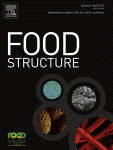
Food Structure-Netherlands
Scope & Guideline
Exploring the Innovations in Food Structure
Introduction
Aims and Scopes
- Food Microstructure Analysis:
Investigating the microstructural characteristics of food materials, utilizing techniques such as microscopy and rheology to understand how these structures influence physical and sensory properties. - Functional Food Development:
Exploring the development of functional foods, including the use of novel ingredients and formulations aimed at improving health benefits, nutritional profiles, and bioavailability of bioactive compounds. - Innovative Food Processing Techniques:
Application of innovative processing methods such as high-pressure processing, ultrasound, and emulsification techniques to enhance food structure and stability. - Biopolymer Interactions and Formulation:
Studying the interactions between various biopolymers, such as proteins and polysaccharides, to develop new food textures and functionalities. - Nutritional and Digestive Implications:
Assessing how food structures affect digestion and nutrient bioavailability, with a focus on the implications for health and dietary guidelines.
Trending and Emerging
- Nanotechnology in Food Science:
An increasing number of articles are exploring the applications of nanotechnology in food processing, including the development of nanocarriers for bioactive compounds and enhanced food delivery systems. - Sustainable Food Systems:
There is a rising trend towards sustainability, with research focusing on eco-friendly materials, waste reduction, and the utilization of by-products in food formulations. - Plant-Based and Alternative Proteins:
The journal is seeing a surge in studies related to plant-based proteins and alternative protein sources, reflecting the growing consumer demand for plant-based diets and meat alternatives. - Food Structure and Health:
Emerging research is increasingly linking food structure to health outcomes, particularly in relation to digestion, nutrient absorption, and the prevention of lifestyle-related diseases. - Smart Food Packaging:
Innovations in food packaging that enhance shelf-life, quality, and safety are becoming a key focus, with studies exploring materials that respond to environmental changes.
Declining or Waning
- Traditional Food Processing Techniques:
There has been a noticeable decrease in studies focusing on conventional food processing methods, as the journal shifts towards more innovative, technology-driven approaches that emphasize sustainability and health. - Basic Ingredient Studies:
Research centered on the fundamental properties of single food ingredients, without application to food systems or structures, is becoming less prominent as the journal seeks to contextualize findings within broader food applications. - Single-Domain Studies:
The focus on isolated studies of specific food components, such as single proteins or carbohydrates, is waning in favor of comprehensive studies that examine complex interactions within food matrices.
Similar Journals
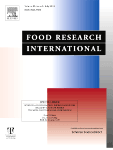
FOOD RESEARCH INTERNATIONAL
Pioneering Discoveries in Nutrition and BiotechnologyFOOD RESEARCH INTERNATIONAL is a premier academic journal published by ELSEVIER, specializing in the field of Food Science. With an impressive impact factor and ranked Q1 in the 2023 category quartiles, it stands at the forefront of research, positioned 17th out of 389 in the Scopus ranking for Agricultural and Biological Sciences, attaining a commendable 95th percentile. The journal publishes high-quality, peer-reviewed articles that cover a broad spectrum of topics, including food safety, quality control, nutrition, and biotechnology, making it an invaluable resource for academics, industry professionals, and students alike. As FOOD RESEARCH INTERNATIONAL seeks to enhance understanding and advance technologies related to food, it encourages innovative perspectives and interdisciplinary research. The journal, active from 1992 and continuing through 2024, is an essential platform for disseminating vital findings and fostering collaboration within the global food science community.

FOOD SCIENCE AND BIOTECHNOLOGY
Shaping Tomorrow's Food Landscape with ScienceFOOD SCIENCE AND BIOTECHNOLOGY, published by the Korean Society of Food Science & Technology (KOSFOST), stands as a prominent peer-reviewed journal dedicated to advancing knowledge in the fields of food science, biotechnology, and applied microbiology. With ISSN 1226-7708 and E-ISSN 2092-6456, this journal serves as a pivotal platform for disseminating high-impact research from South Korea and beyond, reflecting a robust Q2 ranking in multiple categories including Applied Microbiology and Biotechnology, Biotechnology, and Food Science as of 2023. The journal's influence is further emphasized by its positions in various Scopus ranks, where it showcases a commendable percentile ranking in Agricultural and Biological Sciences and Biochemistry. Although access options remain limited, the journal’s objectives revolve around the publication of innovative research, fostering interdisciplinary collaboration, and facilitating the exchange of ideas among a diverse community of researchers, professionals, and students. Whether you are involved in food technology, microbial biotechnology, or nutritional sciences, FOOD SCIENCE AND BIOTECHNOLOGY are instrumental in shaping the future of these critical fields, propelling advancements that enrich our understanding of food systems and health.

JOURNAL OF THE JAPANESE SOCIETY FOR FOOD SCIENCE AND TECHNOLOGY-NIPPON SHOKUHIN KAGAKU KOGAKU KAISHI
Elevating Research in Culinary Science and TechnologyWelcome to the JOURNAL OF THE JAPANESE SOCIETY FOR FOOD SCIENCE AND TECHNOLOGY-NIPPON SHOKUHIN KAGAKU KOGAKU KAISHI, a pivotal platform for the advancement of food science and technology. Published by the Japan Society for Food Science and Technology, this esteemed journal has been contributing to the field since 1995 and continues to publish innovative research and reviews that foster knowledge and collaboration among researchers, professionals, and students interested in food science. Although it currently holds a Q4 ranking within the Food Science category, the journal's commitment to disseminating valuable insights showcases its potential as a resource for emerging trends and applications in food technology. While it does not offer open access options, it maintains a rigorous peer-review process to ensure the quality of its content. As this journal progresses into its convergence years through 2024, it remains an essential resource for those passionate about exploring the intersections of food science and technology in Japan and beyond.
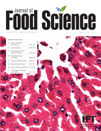
JOURNAL OF FOOD SCIENCE
Transforming Discoveries into Practical SolutionsJOURNAL OF FOOD SCIENCE, published by Wiley, is a premier journal dedicated to advancing the field of food science, bridging the gap between fundamental research and practical application. With an impressive impact factor reflecting its authoritative status, the journal is ranked in the Q1 quartile for Food Science in 2023 and boasts a Scopus ranking of #71 out of 389, placing it in the 81st percentile within Agricultural and Biological Sciences. First launched in 1936, the journal continues to serve as an essential platform for researchers, professionals, and students to disseminate innovative studies and reviews that address critical issues in food quality, safety, and technology. While not currently offering open access, its rigorous peer-review process ensures the dissemination of high-quality and impactful research. Researchers engaged in the vital disciplines of food science will find this journal indispensable for keeping abreast of cutting-edge developments in the field.
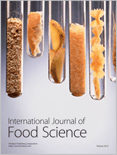
International Journal of Food Science
Fostering Collaboration in Food Science ResearchThe International Journal of Food Science, published by HINDAWI LTD, stands as a crucial platform for advancing knowledge within the realm of food science. Established in 2013, this Open Access journal based in Egypt has garnered significant recognition, achieving an impressive Q2 classification in the 2023 Food Science category, which reflects its commitment to quality and impactful research. With a Scopus rank of #88 out of 389 in Agricultural and Biological Sciences and placing in the 77th percentile, this journal serves as an essential resource for researchers, professionals, and students dedicated to innovative developments and scientific exploration in food science. The journal not only provides unrestricted access to valuable research but also aims to foster collaboration and dissemination of knowledge on critical issues affecting food safety, nutrition, and technology. For those looking to keep abreast of the latest advancements, the International Journal of Food Science is certainly an indispensable addition to their academic pursuits.

Journal of Food and Nutrition Research
Championing Research for Optimal Nutrition and HealthJournal of Food and Nutrition Research, published by the VUP FOOD RESEARCH INST in Bratislava, Slovakia, serves as a vital platform for disseminating cutting-edge research in the fields of food science and nutrition. With an ISSN of 1336-8672 and an E-ISSN of 1338-4260, this journal emphasizes the importance of interdisciplinary approaches to address contemporary challenges related to food quality, dietary practices, and nutritional health. Notably recognized in the 2023 Scopus rankings, the journal is classified in Q3 quartiles for both Food Science and Nutrition & Dietetics, providing a forum for researchers aiming to enhance knowledge and practices within these domains. Those engaged in academia and industry will find the journal invaluable for its comprehensive scope, which covers novel food technologies, nutrition interventions, and the implications of dietary behaviors. Though not open access, the journal is dedicated to enriching the academic conversation and contributing to advancements in public health and nutrition policies.
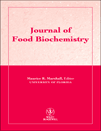
JOURNAL OF FOOD BIOCHEMISTRY
Bridging Food Science and Biochemistry for InnovationJOURNAL OF FOOD BIOCHEMISTRY, published by Wiley-Hindawi in the United Kingdom, is a premier peer-reviewed journal dedicated to advancing the scientific understanding of food biochemistry. With an extensive publication history spanning from 1977 to 2024, this journal aims to bridge the gap between food science and biochemistry, making significant contributions to the understanding of food structure and composition. The journal boasts impressive Scopus rankings, placing it within the top quartile in Food Science and Q2 in Biophysics and Pharmacology, affirming its influence in the field. Notably, it provides critical insights that are vital for researchers, professionals, and students aiming to explore the biochemical processes involved in food production and safety. Despite not being open access, the journal ensures wide distribution of high-quality research, fostering collaboration and innovation within the scientific community. The impact factor reflects its relevance and quality, further solidifying its status as a key resource for cutting-edge research in food biochemistry.

Food Chemistry-X
Advancing the Science of Flavor and Safety.Food Chemistry-X is a premier open-access journal published by Elsevier, dedicated to advancing the field of food chemistry through high-quality research and comprehensive reviews. With its ISSN of 2590-1575, the journal has gained significant attention since adopting an open-access model in 2019, allowing wide dissemination of knowledge and innovations in food science. Based in the United Kingdom, it holds prestigious Q1 rankings in both Analytical Chemistry and Food Science categories as of 2023, positioning itself as a leading platform for researchers worldwide. The journal's focus spans extensive topics within food chemistry, including food safety, nutritional analysis, and the chemical properties of food, offering insights that are crucial for addressing contemporary challenges in food production and consumption. With a Scopus rank placing it in the 65th percentile among the top journals in Food Science and the 58th percentile in Analytical Chemistry, Food Chemistry-X is an essential resource for academics, professionals, and students seeking to stay at the forefront of research and innovation in this vibrant field.

Journal of Food Science and Technology-Ukraine
Connecting Global Minds in Food Technology ResearchJournal of Food Science and Technology-Ukraine, published by the Odesa National University of Technology, stands as a pivotal platform dedicated to the dissemination of high-quality research in the field of food science and technology. With its open access policy established in 2014, the journal fosters global knowledge sharing and accessibility, enabling researchers, professionals, and students to access critical findings and advancements in food technology without barriers. The journal's commitment to publishing innovative studies, reviews, and case analyses reinforces its role in addressing contemporary challenges in food safety, preservation, processing, and nutritional quality. With ISSN 2073-8684 and E-ISSN 2409-7004, it serves as a valuable resource for the academic community, supporting the advancement of food science knowledge and its practical applications.
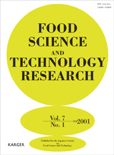
FOOD SCIENCE AND TECHNOLOGY RESEARCH
Transforming Food Technology Through ScienceFOOD SCIENCE AND TECHNOLOGY RESEARCH, published by the Japanese Society of Food Science & Technology, is a pivotal journal that encompasses a wide spectrum of research in the fields of food science, biotechnology, and engineering. With its ISSN number 1344-6606 and a digital counterpart E-ISSN 1881-3984, this journal aims to disseminate cutting-edge research and innovative technologies that enhance food safety, quality, and sustainability. Recognized for its contributions, it holds a Q3 category ranking in multiple disciplines, including Food Science and Biotechnology, indicating a significant role in advancing academic discourse. Researchers and professionals can benefit from its insights, as the journal covers an array of topics relevant to industrial applications, marketing strategies, and scientific advancements. Although not an open-access journal, it has a wide reach and is committed to providing high-quality, peer-reviewed content essential for scholars and practitioners in the food science community from 1999 to 2024.